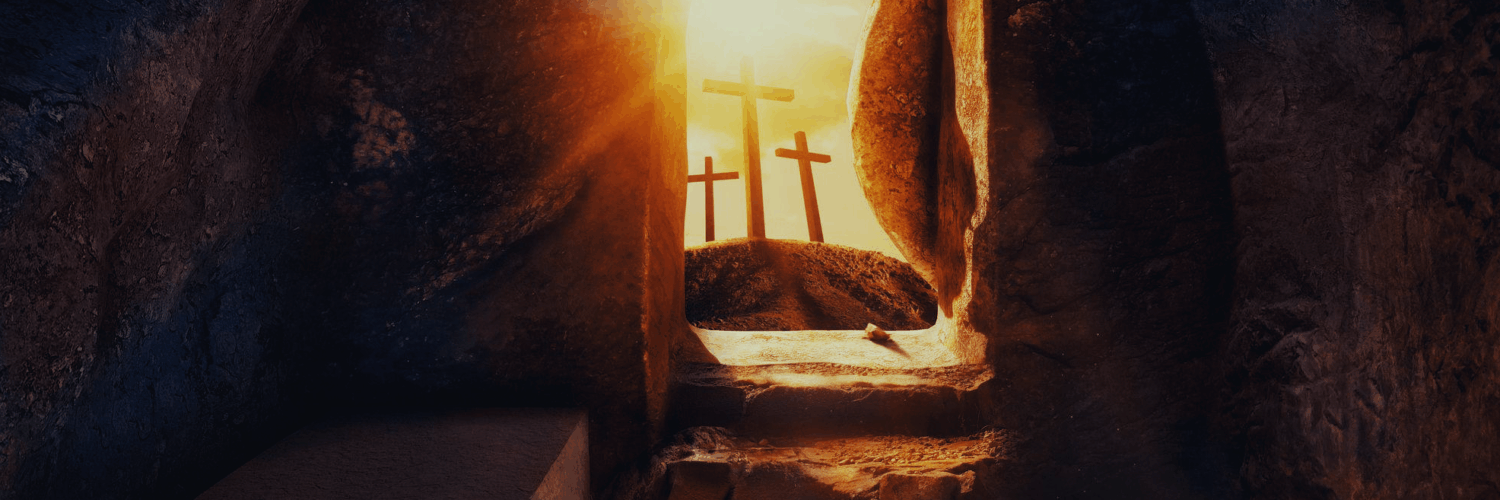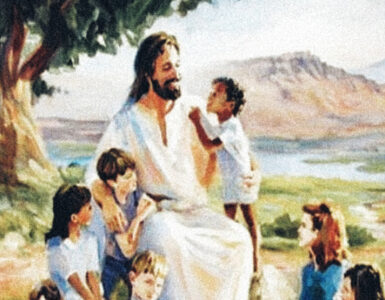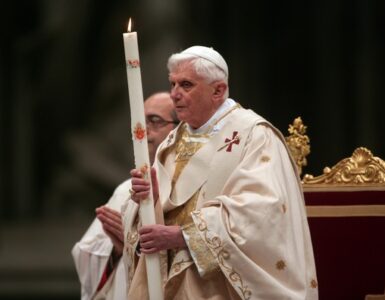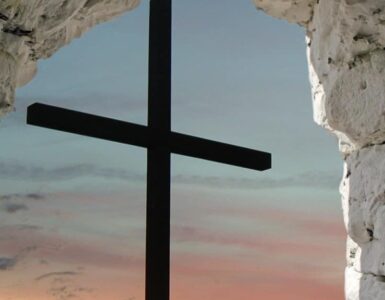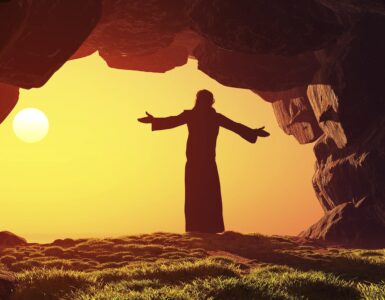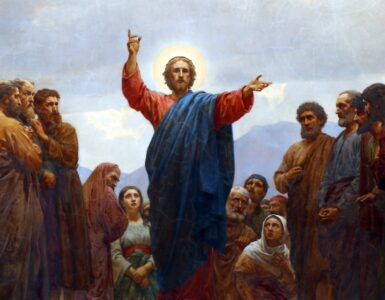Easter is the most festive season of the Liturgical Year. It is a time of both joy and remembrance. It can easily be a time to lose focus as Spring begins and things start to get busy. Just as we are meant to keep a penitential attitude throughout Lent, we are meant to keep a celebratory attitude during the 50 days of Easter. I am presenting text from the Exultet as a guide for the meditations. I encourage you to take these texts to prayer as we celebrate new life in Christ.
First Reflection
Exalt, let all the Earth Exalt, let Angel ministers of God exult, let the Trumpet of Salvation sound aloud our mighty King's triumph.. Exultet, lines 1-2
Read Revelation, chapter 20 and Gospel of John, chapter 21.
The readings for the Easter Season offer us a vista of past, present, and future events. We read throughout the book of Acts how the Apostles were brought before the Sanhedrin. They are questioned about their preaching. Peter, now restored to grace, defiantly tells them that it is better “to obey God and not men.” This is in marked contrast to the fear that they all had felt a short time ago during Jesus’ Passion and Death. The Sanhedrin is at a loss as to how to deal with them. They put them out and then flogged. In spite of this disgrace the Apostles went away rejoicing to “have suffered dishonor for the Kingdom of God.”
Revelation presents a vision of Eternity where countless angels worship before God. They cry out “Worthy is the Lamb who was slain to receive glory and power, wisdom and strength, honor and glory and praise.” All the beauty and pageantry centers on the “the One who sits on the throne and the Lamb.” This, for us, is our future. We are called to share Eternity with God. If we long for holiness and repent for our sins, and most of all believe in the Son of God, this will be our future.
Then, we come to a present moment. John 21 takes us to the time of Jesus’ appearance at the Sea of Tiberias, and Peter’s reconciliation with Him. Peter and the other disciples had gone back to their trade, fishing. They had “fallen off the way,” and now needed to be called back to the fold. Peter had the farthest to come. He denied Jesus three times. Now, he is given the opportunity to repent. This is a “present moment,” although it recalls a past event. As the celebration of Mass brings Jesus’ one sacrifice into the present, reconciliation brings Jesus’ mercy and forgiveness into our time. Jesus forgave Peter and called him to self-less love. Jesus is present to us in the blessed Sacrament of Reconciliation. No matter what we have done or how we have failed, Jesus brings us to this Divine Mercy when we go to go Confession. We hear Jesus again tell us what He told Peter all those years ago. “Follow me.”
For today, let us take time to reflect on how we use the Sacrament of Reconciliation to follow Jesus as His disciple. Amen. Alleluia!
Second Reflection
Rejoice, let Mother Church rejoice, arrayed with the lightning of his glory,..filled with the mighty voices of the peoples.. Exultet, lines 6-7
Read Acts 6:8-15 and Acts: 7: 54-60
St. Stephen gives his witness in the Sanhedrin. Since no one could defeat him in debate his rivals used lies to attack him. He held to his confidence in Christ as he stood before them. He would become the first Christian martyr. He was the first of many sacrificial witnesses who laid the foundation of the Church. The Early Church Father Tertullian wrote that the blood of martyrs is the seed of the Church. And the Church is filled with the mighty voices of so many who followed Christ over the years. Jesus didn’t start a social movement or a new philosophy. He didn’t found a nation or an institution. He founded a Church. The Church is His Bride. And we are all part of it. We don’t live each on our own as isolated entities. We live as Christians being one Church with its sacraments and prayers. It’s not enough to say life is just “me and God.” We need to always be aware of the Church we are a part of. This is the Church St. Stephen, and all the other martyrs, died for. It is the Church so many yearned for. The crowds in today’s Gospel came searching for Jesus because he fed the 5000 when He multiplied the bread loaves. When they found Him, He called on them to do the will of God. We, as members of the Church He founded, are called to seek God’s will as part of His Holy Church.
Let us give thanks for the Martyrs today who became the foundation stones for Mother Church. Amen.
Third Reflection
It is truly right and just, with ardent love of mind and heart.., to acclaim our God invisible, the almighty Father, and Jesus Christ, our Lord, his Son, His only begotten, Who for our sake paid Adam's debt to the Eternal Father and, pouring out his own dear Blood, wiped clean the record of our ancient sinfulness.. Exultet, 18-20
Read Acts 7: 1-53 and John 14:1-11
It’s all back to basics today. Saul of Tarsus would go on to write about Christ and the Gospel, in spite his former role as a persecutor of the Church. It’s all about the Gospel. And it’s all about how Jesus redeemed us by His blood. People want to have straight and clear answers to life. Certainty is a sought-after commodity. It’s only human to want to know how things really are. No one wants to be left in the dark. The irony is this, people easily miss the truth when it’s right in front of them. Philip asked for Jesus to show him and the Apostles the Father. Jesus responded that to see Him was to see the Father. Jesus’ whole mission as the Messiah was to bring salvation to Israel and to the whole World, and to reconcile all humanity to the Father. It’s easy to forget or underestimate this truth. Yet, there it is. Jesus redeems us and brings us back to the Father. This truth illuminates all the truths of Catholic life. We cannot bridge the gap between us and God the Father on our own. Only Jesus redeems us from “Adam’s debt” that fell on us all. It can never be said enough. Jesus brings us all back to the Father.
Let’s take some time simply to pray in gratitude today for Jesus’ gift of salvation. Amen.
Fourth Reflection
These then are the feasts of Passover, in which is slain the Lamb, the one true Lamb, whose Blood anoints the doorposts of believers... (by which) once you led our Forebears, Israel's children from slavery in Egypt and made them pass dry-shod through the Red Sea. Exultet, 23-24
Read Acts 8:11-17
Today we have a hard reading in the Acts of the Apostles. It tells of how “a severe persecution” broke out against the Church. Stephen was buried, Saul continued to attack Christians, and Philip continued to Macedonia. Christians have been persecuted since the Church’s beginning. It is not something which is isolated and rare. Christians face persecution even today in different parts of the World. We find encouragement from Jesus who is our Risen Lord. He promised then and now “not to lose anything” of what the Father gave Him.
We are His own, the children of the Lamb. Jesus’ one sacrifice gives us new life despite persecution and death. We are set free. We pass through death to life as the Israelites passed through the Red Sea. Jesus’ one sacrifice is an everlasting Passover for all who believe in Him. His blood was shed and is salvific for all Christians, especially those who live under constant persecution and the threat of death.
Let’s take some time today to pray for everyone anywhere who is facing persecution and give thanks for the “one true Lamb” who gave His life for us. Amen.
Fifth Reflection
This is the night that even now, throughout the World, sets Christian believers apart from Worldly vices and from the gloom of sin, leading them to grace... Exultet, 28-29
To be a Christian believer means to be set apart. Consecrated entirely for the Lord. We find this in today’s reading from Acts. Philip encounters an Ethiopian Eunuch who is reading scripture. Here Philip evangelizes someone who is spiritually open and needs instruction. This whole event is a Holy Spirit led encounter. The Eunuch was reading from the prophet Isaiah. Philip, inspired by the Holy Spirit, opens the scripture for him. Then Philip baptizes him at his request. This story is beautiful because it shows us how one came to conversion through an authentic encounter. Philip became the instrument by which God worked to bring this man into a new life.
Baptism does this for the Christian. It sets somebody apart from the World. A Christian is in the World and fully acting in it; yet, paradoxically, not belonging to it. This blessed sacrament also works to set one apart from sin and leads them to grace. We renew our vows of Baptism every year so that we never lose sight of our belonging to God.
For today, simply focus on what it means to be a Baptized member of the Body of Christ. How often do you realize how great a gift it is? How much do you appreciate your baptism? Give thanks for it. Amen.
Sixth Reflection
The Sanctifying power of Easter dispels wickedness, washes faults away, restores innocence to the fallen, and joy to mourners, drives out hatred, fosters concord, and brings down the mighty. Exultet, 43-45
Read Acts 9: 1-30.
Saul of Tarsus came to understand these words very well. He believed that Christianity was a heresy to Judaism, and he made clear his intent to destroy it. He received documents from the Chief Priests and Pharisees to seek out and destroy the Christian community. He unknowingly did something wicked, and on the way to Damascus he was shown the truth. He had hatred, and this was turned to love. He thought of himself as mighty, and he was brought to his knees. He came to have concord and fellowship with Christians, and those who were terrified of his threat were now given joy in place of mourning.
Read John 6:1-47.
The Jews at Capernaum did not understand how Jesus would give them His flesh to eat. Jesus tells them that He was sent by the “living father,” and that only those who feed on Him, the bread from Heaven, would have life. Eternal life. Jesus was speaking of the Eucharist, where He would form a holy sacrament that would give life to those who would have faith in Him. It’s not that believers consume Jesus as food. Jesus consumes us with His life. Partaking of the Eucharist opens us to Divine Life in the same way Jesus inducted Saul into His Kingdom. Again, this is the joy of Easter “when things of Heaven are wed to those of Earth, and the divine to the Human.” Exultet, 53-54.
Seventh Reflection
The Exultet ends by declaring Christ is “the one Morning star who never sets, who, come back from death's domain, has shed his peaceful light on humanity, and lives and reigns forever and ever.” Exultet, 60-62
Read Acts: 9:30-43 & John 6: 48-71.
Let us end these reflections with more snapshots from Jesus’ public ministry and the ministry of the Early Church. St. Peter travels from place to place while the Church is at peace. It may be confusing, but the Gospel of John takes us back to a hard time. At the end of the Bread of Life discourse Jesus holds firm to His teaching. The crowd who was there rejects this, and many followers “returned to their former way of life.” This scene showed how so many people rejected Jesus and didn’t understand what He was trying to say. The Twelve disciples did not understand this Eucharistic teaching at first, yet they stuck with Jesus. Peter, to his credit, gave Jesus his full support. “To whom shall we go? You have the words of eternal life. We are convinced you are the Holy One of God.” For all the criticism St. Peter gets, we can give him props for standing with Jesus and keeping to his faith. We learn from this that we won’t always understand life. We always don’t get the closure we need when life is hard. Like St. Peter, we know we have life everlasting in Jesus. We know that Jesus Christ is life itself, and gives us peace during pain, light in the wake of darkness, and life when death is near. Amen. Alleluia!


